Are you seeking a refreshing and healthy beverage? It is a great idea to eat a watermelon. While you eat watermelon, what comes to your mind first when someone offers you to have watermelons? It’s sweet, right? Do you ever think how many calories are in watermelon if it comes with this much sweetness? In this article, we will tell you all the calories of watermelon, its health benefits, its sugar content, and many more.
The sweet, juicy, and refreshing taste of watermelon makes it an excellent summer snack. A watermelon’s vibrant hue, crunchy texture, and sweet, juicy flavor make it one of the most popular fruits in the world.
But did you know how many calories are in watermelon? No? No worries, we will reveal the calorie mystery for you. Watermelon is very healthy and low in calories, and many people are unaware of this. There are just 46 calories in a cup of diced watermelon.
Table of Contents
What is the Watermelon?
Watermelon is a type of fruit that belongs to the Cucurbitaceae family, which also includes cucumbers, squash, and pumpkins. A native of tropical Africa, the banana is now grown in many countries around the world, such as the United States, China, and Spain.
Watermelon is a large, round, or oblong-shaped fruit with a tough, green rind and juicy, pink, or red flesh. The best time to consume them is during the summer months when they are at the ripest and sweetest.
Watermelons are excellent sources of hydration since they are composed of over 90% water. Fruit is also a good source of vitamins and minerals, including vitamin C, vitamin A, and potassium. Watermelons also contain antioxidants, which may be beneficial for health, including reducing inflammation and helping to lower disease risk.
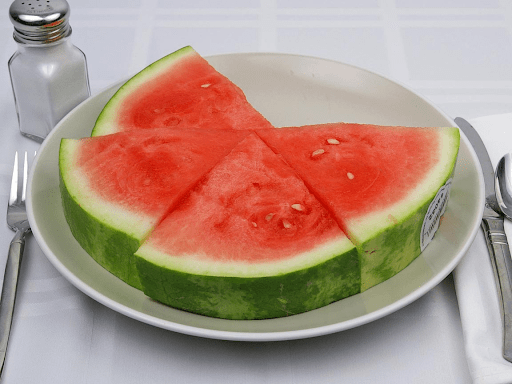
Did You Know the Nutritional Calorie Count of Watermelon?
The calorie count in watermelon varies with the serving size. For example, one cup of watermelon slices contains approximately 46 calories. If you prefer half a cup (76 grams), it’s just 23 calories, and in 100 grams, you’ll find about 30 calories.
If we look into the nutritional profile of 100 grams of a cup of watermelon, it contains 6.2 grams of sugar, making it a naturally sweet treat. Protein is minimal at 0.6 grams, and the fruit’s carbohydrate content is 7.6 grams, with minor fat at 0.2 grams and 0.4 grams of fiber.
·Know the Carbohydrates Count in Watermelon
Carbohydrates in watermelon are primarily sugars, mainly fructose, with some glucose and a small amount of sucrose. One cup of diced watermelon (152 grams) contains 11.5 grams of total carbohydrates and 10.9 grams of net carbohydrates. A medium-sized wedge of watermelon (286 grams) offers 21.6 grams of carbohydrates and 21 grams of net carbohydrates.
·Fiber Value in Watermelon
The fiber content in a 100-gram serving of watermelon makes it a poor source of this nutrient. It’s important to note that, due to its fructose content, watermelon is high in FODMAPs (fermentable oligosaccharides, disaccharides, monosaccharides, and polyols). This leads to digestive discomfort for individuals with fructose malabsorption when consuming large quantities of watermelon.
·Watermelons and Vitamins
Watermelon offers many essential vitamins and minerals. It is particularly rich in vitamin C, which supports immune function. It also provides vitamin B5, known as pantothenic acid, and vitamin A, derived from beta-carotene in watermelon. The fruit supplies potassium, crucial for maintaining healthy blood pressure and heart function, as well as copper, a mineral often lacking in Western diets.
Watermelon Calories Count According to Its Size
How many calories are in watermelon also depends on the size of this fruit. Here are the calorie counts according to the range of portions you take of a watermelon –
- One Cup of Watermelon –A one-cup serving of watermelon offers a simple 46 calories. This portion allows you to treat in a satisfying snack without worrying about excessive calorie consumption.
- Wedge Size – A large wedge of watermelon, roughly contains 286 grams, and you’ll find it contains around 86 calories. While this is still low, it’s vital to be aware of the increase in calories with larger portions.
- 100 Grams – For those who prefer measuring in weight, 100 grams of watermelon yields roughly 30 calories. It’s an easily manageable portion that ensures you get your watermelon fix without overeating.
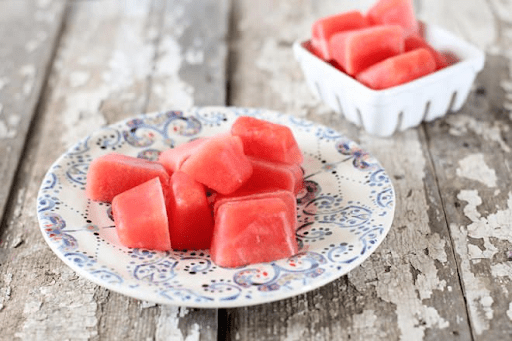
Watermelon Sweet Treat and Calories
Watermelon has a rich and natural sweetness that attracts people. But how many calories are in watermelon when it comes to this sweetness? It is one of the fascinating facts about watermelon that the calorie count remains low due to its minimal sugar content. It is best for those who are looking for a healthy and refreshing alternative. Here is the calorie-wise advantage of watermelon’s low sugar content –
- Natural Sweetness – Watermelon’s taste comes from its natural sugars, largely fructose. While it’s sweet, the fructose content remains modest.
- Caloric Density –Watermelon’s low caloric density is a result of its low sugar content. This means you can enjoy a substantial serving without worrying about excessive calorie intake.
- Weight Management – Due to its low sugar and calorie content, watermelon can be a partner in weight management and weight loss programs.
- Nutrient-Packed – Watermelon is not just about sweetness but also it is rich in vitamins, minerals, and antioxidants, providing health benefits beyond its taste.
- Hydration – watermelon is an excellent hydrator. It reduces your thirst while contributing to your daily fluid intake.
Watermelon’s Glycemic Impact & Calorie Balance
Watermelon has a high glycemic index which suggests a relatively fast blood sugar spike upon consumption, it’s essential to recognize that this effect is influenced by serving size. The key to managing the glycemic impact of watermelon is portion control. Smaller servings, such as a cup or half a cup, have a more moderate effect on blood sugar due to the smaller carbohydrate intake. Watermelon’s high water content also contributes to slower sugar absorption, providing a dual benefit of hydration and a steadier blood sugar response.
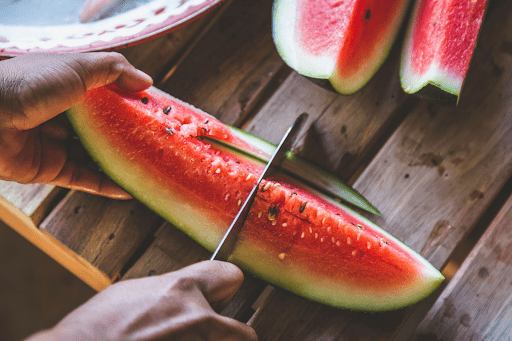
How to grow a watermelon?
A watermelon garden can be a rewarding and enjoyable gardening project, whether you have a backyard garden or a small container on your balcony. Watermelon is a heat-loving plant that thrives in warm climates, so it is best grown in regions with long, hot summers. The following tips will help you grow a watermelon:
Choose the right location: You should choose a spot in your garden that receives at least eight hours of direct sunlight per day and avoid areas with standing water or heavy clay soil.
Start seeds indoors or purchase seedlings: The watermelon can be started from seeds in pots inside or purchased as seedlings from a nursery. If starting from seeds, sow them in pots filled with a seed-starting mix approximately 6-8 weeks before the last frost date in your area, and transplant them into the garden after the last frost.
Plant watermelons in hills: Watermelons are best grown by mounding soil approximately three feet in diameter and twelve inches in height, which allows the plants to drain excess water and maintain good air circulation. Three to four seeds should be planted in the center of the hill and thinned to the strongest seedlings once they have germinated.
Provide support: The vines of watermelons are heavy and can become unwieldy when not supported. Use a trellis or cage to support the vines and keep the fruit off the ground.
Water regularly: A watermelon should be watered regularly, particularly during periods of dry weather. Ensure that the soil around the roots is moistened, and do not get the foliage wet because this can promote the growth of fungal diseases.
Fertilize The best way to ensure a healthy crop of watermelon is to fertilize it regularly. Use a balanced fertilizer, such as a 10-10-10 or 20-20-20 formula, and follow the instructions on the package for the correct amount of fertilizer.
Monitor for pests and diseases: The watermelon plant is susceptible to pests such as cucumber beetles and squash bugs, as well as diseases such as powdery mildew and mosaic virus. Be aware of any signs of these problems and take appropriate measures to prevent them, such as removing pests manually or using organic pesticides.
The following tips will assist you in growing watermelons in your garden or container.
Top 7 Benefits of Watermelon
The following are the benefits of Watermelon:
1.Hydration
Watermelon is composed of over 90% water, making it an excellent source of hydration. The cooling effect of this beverage is particularly beneficial in hot weather or during exercise.
2.Low in calories
A cup of diced watermelon contains only 46 calories, making it an ideal fruit option for those seeking a low-calorie diet.
3.Antioxidant properties
The antioxidants found in watermelons may have a wide range of health benefits, including reducing inflammation and decreasing the risk of certain diseases.

4.May aid in weight loss
The high water content and low-calorie count of watermelon may lead to weight loss benefits. This potential benefit, however, requires further research to be fully understood.
5.May improve heart health
Some research suggests that watermelon may have heart-healthy benefits due to its high lycopene content. Lycopene is a powerful antioxidant that has been linked to a reduced risk of heart disease.
6.May reduce muscle soreness
Watermelon or watermelon juice may help reduce muscle soreness and facilitate recovery after exercise, according to some studies.
7.High in vitamins and minerals
Watermelon is a good source of vitamins and minerals, such as vitamin C, vitamin A, and potassium.
How to Incorporate Watermelon into Your Diet?
Watermelon can be incorporated into your diet in several ways:
Eat it as a snack
Watermelon is a delicious and refreshing snack on its own. It can be cut into slices or cubes and enjoyed as is.

Add it to a salad
A salad with watermelon adds a burst of flavor and color. It can be added to a mixed green salad or a salad based on grains, such as quinoa or farro.
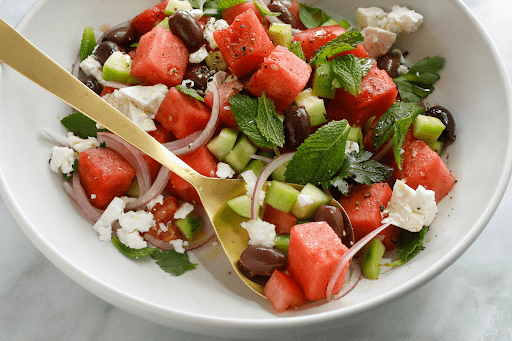
Make a smoothie
Watermelon is a delicious and refreshing addition to smoothies. You can combine it with other fruits and liquids, such as coconut water or almond milk, to make a smoothie.
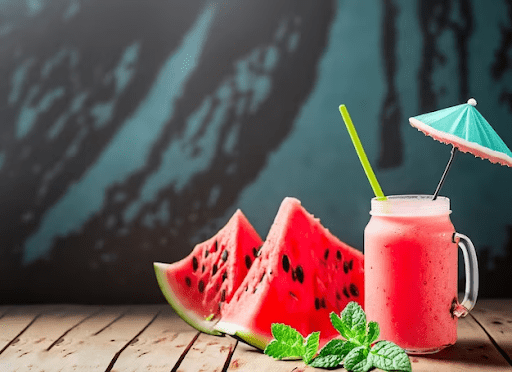
Grill it
The taste of grilled watermelon is unique and delicious. It is simply necessary to slice the watermelon into thick wedges and brush the wedges.
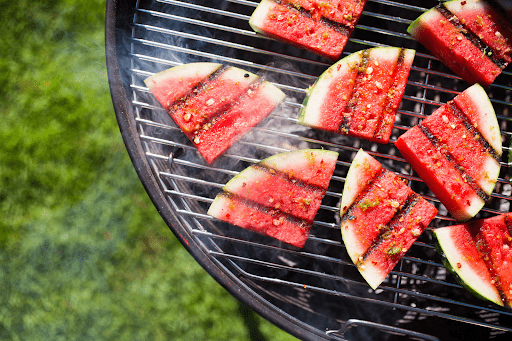
Which country does like to eat watermelon?
Watermelon is a popular fruit throughout the world. It is grown in many tropical, subtropical, and temperate regions. Some of the countries in which watermelon is particularly popular are the following:
United States: Watermelon is a popular summer fruit in the United States and is often consumed as a refreshing snack when it is hot outside.
China: China consumes large quantities of watermelon during the summer season, making it one of the most popular fruits.
Turkey: Turkey has a long tradition of consumption of watermelon as a refreshing snack or dessert.
Brazil: Brazil is widely known for its watermelon, which is often consumed as a refreshing snack or used in salads and other dishes.
India: Watermelon is a popular fruit in India, where it is often consumed as a refreshing snack or used in juices and other beverages.
Conclusion:
Watermelon is a refreshing and hydrating fruit that is native to tropical Africa but is now grown throughout the world. Hope, now you get all about how many calories are in watermelon. watermelon is low in calories, containing approximately 46 calories in one cup of diced watermelon. It also contains several vitamins and minerals, including vitamin C, vitamin A, and potassium.
The antioxidants contained in watermelon may provide several health benefits. You can enjoy watermelon in many ways, such as as a snack, in salads, in smoothies, or grilled. It is a healthy and tasty addition to any diet to consume watermelon.
Frequently Ask QuestionsQ1 : What is the calorie content of a typical serving of watermelon?Ans: A one-cup (154-gram) serving of diced watermelon contains approximately 46 calories. Q2 : Are there any variations in calorie content between different types of watermelon?Ans: The calorie content in various types of watermelon remains relatively consistent. However, it may vary slightly based on factors like ripeness and growing conditions. Q3 : How do the calories in watermelon compare to other fruits?Ans: Watermelon is a low-calorie fruit compared to many others. For example, it contains fewer calories than bananas, grapes, and mangoes per serving. Q4 : Can the calorie count of watermelon change if it’s blended into a smoothie or juice?Ans: Blending watermelon into a smoothie or juice doesn’t change its calorie content. However, adding other ingredients like sugar or yogurt will increase the overall calorie count of the beverage. Q5 : Is it possible for the calorie content of watermelon to increase as it ripens?Ans: The calorie content of watermelon remains relatively stable as it ripens. What can change is the sweetness and flavor, which might make it seem like it has more calories due to increased sugar concentration. Q6 : How can I accurately estimate the calorie content of watermelon if I don’t have a food scale?Ans: You can estimate the calories in watermelon using common household measures. For instance, a small wedge (approximately 1/16th of a medium-sized watermelon) contains roughly 16-20 calories, and a typical one-cup serving has around 46 calories. |

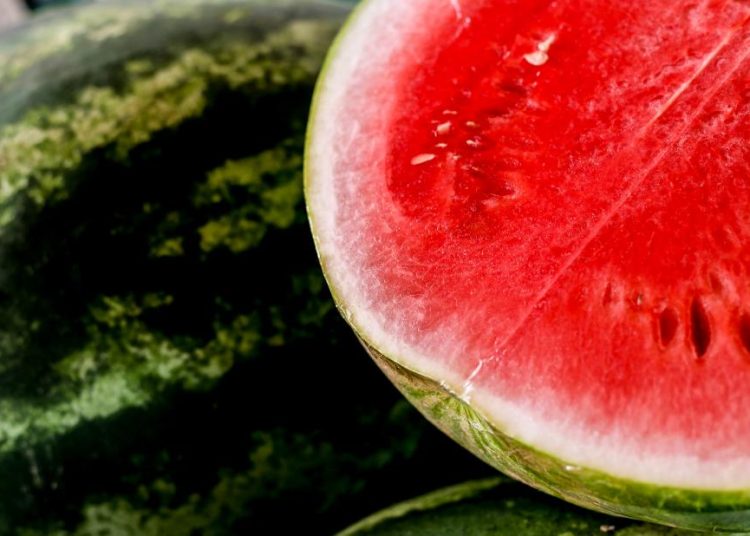








![Is Tokyo Ghoul on Netflix? [How to Watch Online]](https://avctv.com/wp-content/uploads/2022/08/AAAABct1DaUzhEt4JeJFeDrmaE_4CGAu39fBN6poMx10hAlWlMRjkkAw84hjmuujWTy2wFC7_Pjnujec-_PqT1GCnnMFMJ15S04baJn1b0WvvbG6hrSNb31_GS4--120x86.jpg)





